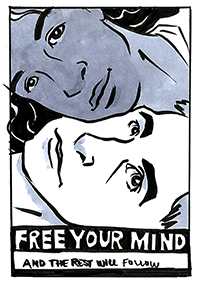International students still fight discrimination
By YOSHIE OKABE
Special to The Collegian
In the United States, we believe in equal rights and opportunities, regardless of race, religion, national origin, social status or sex. Web sites like tolerance.org promote cultural appreciation.

“Although de jure segregation and unequal treatment are now illegal,” according to Dr. Matthew Jendian, a Fresno State sociology professor, “de facto discrimination and prejudice persist.”
Nihashi Midori, an international student from Japan, experienced discrimination at the airport. “I feel some flight attendants treat Caucasians differently than Asians, looking negatively at me and others who don’t speak English proficiently,” she said.
“Some people have asked me whether a university exists in my country?” said Ali Idrissa, an international student from Niger. Many assume Africa is an uneducated, diseased, jungle continent, engaged in perpetual civil war — an impression fostered by mainstream U.S. media’s stereotypical depiction.
Some Americans, feeling sympathy and wanting to help, donate to charities in Africa. While they may be able to reduce the emotional discomfort by giving money, they remain disconnected from the people there. Giving money is important and helpful, but we must also come face to face with people of other countries to learn about each other and address the roots of one another’s problems.
“When I was discriminated against at the airport, I felt very sad. I wonder if it was because of my race or my poor English,” said Midori. “Regardless, I still feel angry.”
Linguistics professor Ren Fu Guo, from China, said, “Before, I felt bad; but, now I take it easy. I’m only responsible for my behavior, so I try not to be upset, understanding some people are ignorant, and I reach out to people around me, regardless of our differences.”
How can we reduce the discrimination and prejudice and resulting hurt? “People need to be educated about cultural differences, and Fresno State offers a variety of such courses,” said Hector Gonzalez, a Fresno State alumnus from Spain.
Unfortunately, enrollment in these classes is not diverse. How many non-Latino students major in Chicano and Latin American Studies? On April 23, at the Native American pow wow on campus, I asked six Caucasian people why they came to the pow wow and all responded similarly: to see their families, relatives, or girlfriends dancing. Why don’t more of us attend events like this to learn about other cultures in our community?
Caucasian students aren’t the only ones who need to reach out. A Caucasian friend of mine told me he dropped a Chicano-Latino Studies class because he was the only white student, even though he was interested in learning about the culture. Some minority students segregate themselves and hang out only with others of similar backgrounds, not welcoming others.
I challenge each of us to step out of our comfort zones and introduce ourselves to others so we can directly experience other cultures. Through personal exposure and interaction, we can educate ourselves and remove the barriers between us.
—Yoshie Okabe is a post-baccalaureate international student from Japan, majoring in geography.
|
